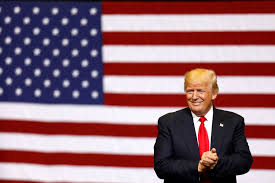FOR PRESIDENT-ELECT DONALD TRUMP, ‘TARIFF’ IS A BEAUTIFUL WORD FOR AMERICAN TRADE
BUT THE US ECONOMY WILL FIND IT TOUGH TO MEET THE CHINESE CHALLENGE WITH GLOBAL IMPACT
Just as the first Christmas tree of the season is going to be lit up in New York’s iconic Rockefeller Plaza, a popular American TV channel was holding an interview with maker of native Christmas trees for decorating American homes. Lo and behold, what the interview about. It was on imposing import tariffs on Christmas trees.
America is in the midst of a tariff hysteria. America is talking of imposing tariffs on Christmas trees imported from abroad, according to a news organisation. This is the level of current hysteria in America over imports from China and other countries, including their neighbours Canada and Mexico.
Why not? In course of his campaign, Trump had said before the Chicago Economics Club that the most
beautiful word in the dictionary is “tariff”. So Trump and America is all set to beautify trade with tariff. But as a matter fact, United States imports Christmas trees worth close to $3 billion a year from China. Local Christmas tree makers —a vanishing tribe due to competition from cheap imports from China— have been protesting and they are now happy that something would surely be done.
There is an issue there, for sure. Since US president Richard Nixon had mainstreamed China into the comity of trading nations, China had taken full advantage of the liberalised market access to build its own muscular manufacturing industries. At the same time, in various pretexts China had shielded its own markets by means of covert tariffs and non-tariff barriers. While others followed, willynilly, the principles of market economics, China followed one kind of economics for its home and another —free trade— for the outside world. The result was what one can see after close to fifty years, China has more production capacity that its internal economy and market could ever absorb and has taken to dumping its products for whatever price it will sell.
Now, with tree surplus with America and rest of the world, China has amassed massive financial power in the form of its bulging foreign exchange reserves. With that China is now proposing to paunch another kind of colonialism. It is calling its variety of neo-colonialism the “BRI” or the euphemistic and misleadingly
named “Belt and Road Initiative” which is another form of domination of countries by imposing huge debts in the guise of building infrastructure facilities. If anything, at long last Donald had found his competitor in China. He is in a position to ram in his tariffs and countervailing measures. Many countries can ill afford to stand up and face up to the Chinese threat. Take, India. We are in another manner unable to shed the Chinese yoke because of our abject dependence on Chinese imports of raw materials.
In India, we import shiploads of Diwali celebration paraphernalia from China, including images of deities and light bulbs for decoration. We have close to $96 billion trade deficit with China but despite strong protests by some political circles, Indian trade officials can do very little to offset the pattern as it will affect a large number of Indian industries which are dependent on cheap Chinese imports.
Admittedly, India has developed a kind of vulnerability to imports from China. The Indian pharmaceuticals industry has become abjectly dependent on imports of API —primary raw materials for manufacturing
drugs— to electronics components. So navigating India’s trade with China is very sensitive. United States on the other hand, has a close to a trillion dollar trade deficit with China and the president elect, Donald Trump, is issuing threats of hefty tariffs on Chinese products every day of his current run up to assuming office in January. There is a fully blown trade war posted to break out fiercely between the USA and China.
Additionally, president elect has further broadened the frontline of attack on imports. Trump has stated that countries, the so-called BRICS— formation members would be slapped with much higher 100% tariffs if they try to put a trading system, abjuring the use of US dollar. He had used rather strong words of threat: those trying to move away from the US dollar were told to go and find other “suckers”. In the latest BRICS
summit held in Brazil, the participating countries had toyed with the idea of using alternative modes and remained anchored to the use of the US dollars for settlements of trade imbalances.
The downside of using dollars is very explicit as the US had slapped sanctions on Russia following the
outbreak of war in Ukraine. Following up the direct sanctions on Russia, USA had slapped similar sanctions on countries doing deals with Russia or Iran.
In this context, USA had also shown its clout by throwing out Russian banks from the dominant international banks’ settlements mechanism, the SWIFT network. Banks of other counties dealing with the sanctioned entities would also be thrown out from SWIFT network.
The Russian president has reacted to the American threats, saying that alternatives to the dollar would inevitably emerge given the way the US has been using its currency. Russian president has decried the way USA has been using the dollar.
Putin said Russia never moving away from dollar, the Russian president observed that it was the US which was preventing using the dollar and not Russia.
But there is reason to believe that trade wars are hotting up and Donald Trump has been taking it to a level of utter confrontation.


Comments are closed, but trackbacks and pingbacks are open.